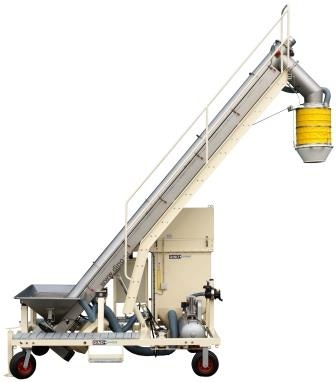Dino Wireless Monitoring System
March 25, 2016

A Dino bulk truck loader transmits a signal itself if a component is not working properly or if maintenance is required. In modern language there are various terms for this: Smart Industry, the Internet of things, or Industry 4.0. Van Beek shows that this new development makes it possible to take the lead again with a machine that has long existed, the Dino Wireless Monitoring System.
Smart Industry
Smart Industry simply means that sensors collect and transmit all sorts of data from a machine so that action can be taken based on these data. "Now we often sell a Dino and usually we do not get any feedback about the operation of the machine. As a result, this can now change," said Mark Jonkers. He is investigating for Van Beek how Smart Industry can be used on the Dino.
Better Service
By fitting Dinos with sensors and their own internet connection Van Beek can collect data remotely on the operation of the bulk truck loader. Based on these data the company can better predict when maintenance is necessary or there is a risk of a malfunction occurring. "The idea is that in this way we can ultimately provide an even better service," said Jonkers.
Remote Detection of Malfunction Cause
"It is also possible to solve problems without a mechanic having to visit,” Jonkers says. "For example: someone calls because his Dino is suddenly no longer working. We can then see remotely that for example a hatch has not been closed properly."
Cost Savings
Smart Industry technology also has a cost-saving effect. "Many components are replaced as a precaution to prevent machine downtime just as they are in vehicles. But what if you can see that a component is still working perfectly well?
For example we have sensors to measure the vibration of a bearing. Every type of bearing has its own healthy vibration and you can compare this with the vibration that you are measuring. So you know immediately whether the bearings need replacing or not. We then replace the components just in time, as it is called."
Why Develop a Smart Dino?
Jonkers has already mentioned a few reasons for doing research into this. By collecting data on the use of the Dino the customer can be better advised on the use of the Dino and components can be replaced just in time. "But this development also makes it possible to monitor Dinos remotely and to build up a database to provide more knowledge about the bulk truck loader,” said Jonkers. “This can again result in a better Dino for our customers."
Three Specialist Areas in One Machine
Jonkers is in the last phase of his Mechatronics studies at Avans Hogescholen in Breda, a combination of mechanical engineering, electronics engineering, and ICT. This area of study arose because there is a growing need for personnel with enough knowledge of all these areas to link them together. "The Dino 4.0 is a perfect example of this,” said Jonkers. “You have a big mechanical machine that is electrically operated and you have all sorts of data from the sensors that have to be processed by a program.”
Van Beek is in the near future starting a large-scale field test with the Dino Wireless Monitoring System. Existing Dino owners can register with Van Beek to take part in this field test.
Van Beek, The Netherlands +31(0)416 37 52 25 www.van-beek.nl
For related articles, news, and equipment reviews, visit our Instrumentation & Control Equipment Zone
Click here for a List of Instrumentation & Control Equipment Manufacturers
You May Also Like


